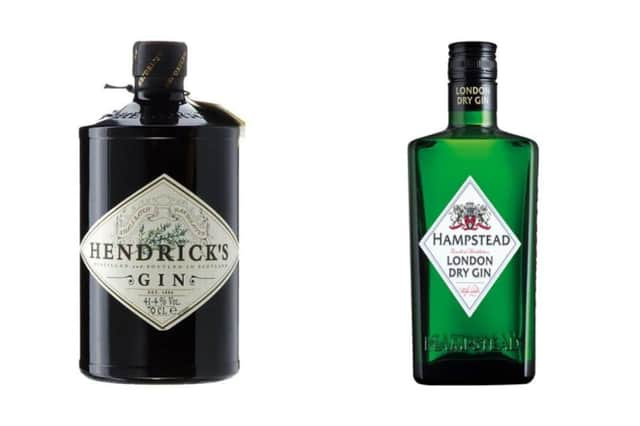Lidl forced to stop selling ‘Hampstead’ gin after being sued by makers of Hendrick’s


Budget supermarket Lidl has been temporarily forced to stop selling bottles of its own branded gin, due to being used by the makers of Hendrick’s gin.
Lidl was sued by owners of Hendrick’s, Scottish firm William Grant and Sons, after the shop revamped the label and bottle of it’s ‘Hampstead’ gin and it resembled that of the design trademarked by Hendrick’s.
Advertisement
Hide AdAdvertisement
Hide AdThe supermarket chain defended its case and claimed there are “clear and obvious differences” between the Hendrick’s trademark and the Hampstead gin product.
The issue was addressed at the Court of Session in Edinburgh, where Lord Clark determined there were clear similarities which “caused at least an association with Hendrick’s.”
German-owned Lidl has been temporarily forced to stop selling Hampstead, which was introduced in the supermarket in 2012 but appeared in its revamped guise in December 2020.
Hendrick’s gin has become known for its diamond-shaped label, which the company trademarked in January 2012.
Advertisement
Hide AdAdvertisement
Hide AdLord Clark acknowledged that there were some similarities in the bottle design and this had led to distinct associations of Hampstead with Hendrick’s.
He also noted Hampstead is now being sold at a pricier £15.99 since its revamp, up from the original version’s price of just £9.99.
In his written judgement, he noted the pursuers argued: “While a substantial volume of products in the defenders’ stores were private label products (i.e. own brand), the defenders did stock other big brands in their United Kingdom stores, such as Coca-Cola, Pepsi, Heinz, Nescafe, Budweiser, Corona, Stella Artois and San Miguel.
“The defenders’ customers were aware that well-known brands can be purchased in the defenders’ supermarkets often at discounted prices in comparison to other retailers.”
Advertisement
Hide AdAdvertisement
Hide AdHe went on to say that Lidl failed to sell Hendrick’s, so Lidl customers would “be familiar with Lidl’s own label brands, such as Hampstead”, but would not expect to find Hendrick’s in store.
With regards to the trade mark, Lord Clark said: “Notwithstanding the existence of some measure of dissimilarity, having regard to a comprehensive assessment, there is a sufficient basis to argue visual and conceptual similarity between the mark and the sign.
“Bottle shape and colour are often intended to be distinguishing features of gin products.
“I accept that the more distinctive the mark the greater is the likelihood of confusion and that the Hendrick’s mark relied upon is quite distinctive and recognised on the market.
Advertisement
Hide AdAdvertisement
Hide Ad“I do consider that there is sufficient material, from the information put before me, to infer (for the purposes of a prima facie case) that there was a deliberate alteration of the get-up of the Hampstead product to seek to cause at least an association with Hendrick’s.
“The defenders also have another get-up to sell the product, which is not challenged, so it is just the sales of Hampstead in this particular get-up that are stopped.”
Commenting on evidence provided by Hendrick’s from social media, in which customers likened Hampstead to a cheap, less enjoyable version of Hendrick’s, Lord Clark said: “From the material put before me, I am in no doubt that the trademark relied upon has a reputation in the United Kingdom.
“I therefore conclude that there is a reasonable prospect of success on the part of the pursuer in showing a change in economic behaviour or a real likelihood of such a change by customers who buy from Lidl, and hence that it has created an unfair advantage.”